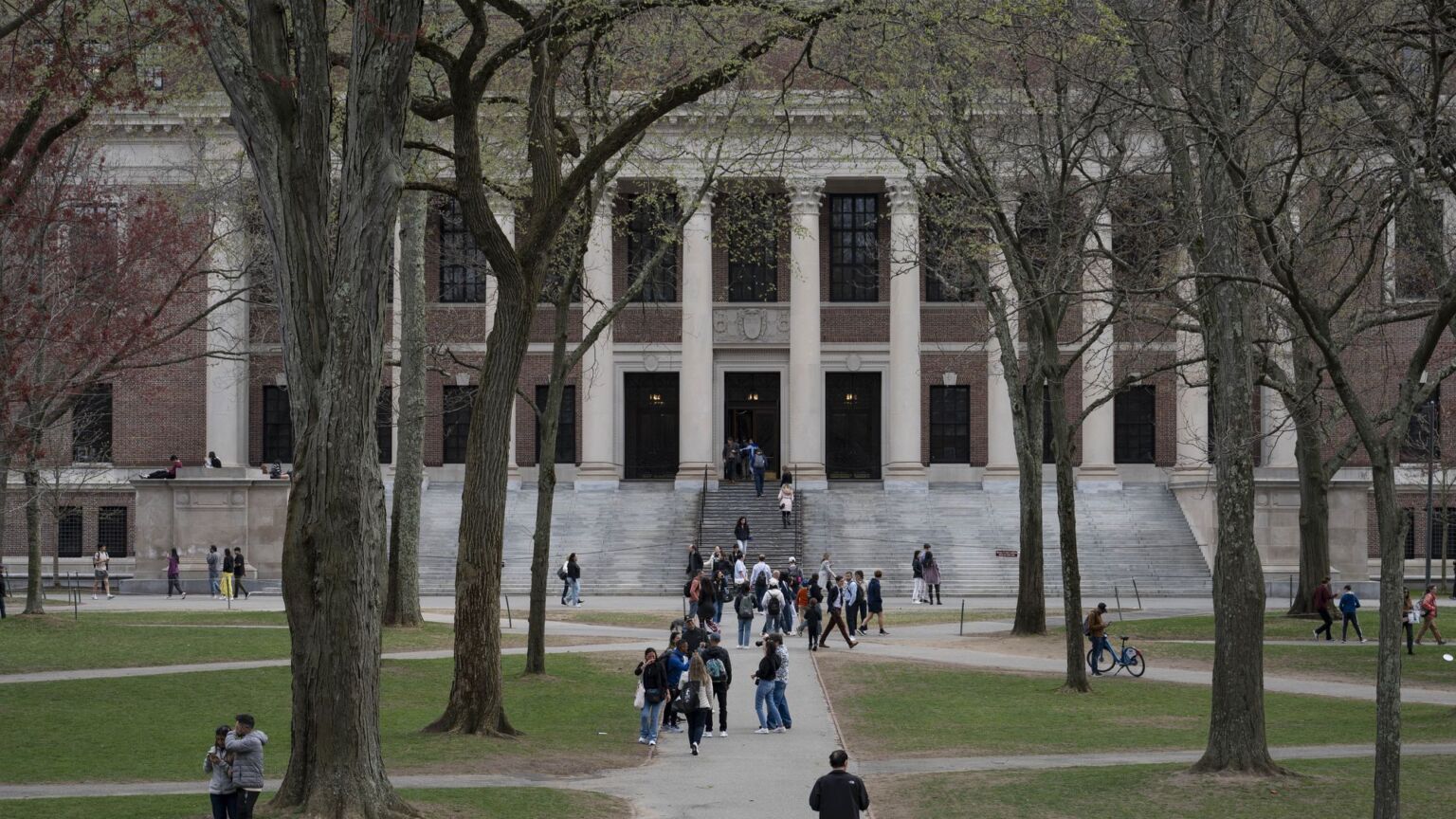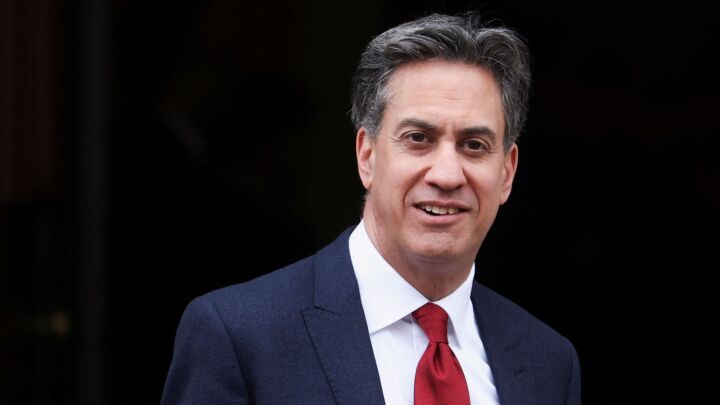Free speech is the loser in Trump’s battle with Harvard
His threats to defund the university will put campus censorship on steroids.

Want to read spiked ad-free? Become a spiked supporter.
US president Donald Trump’s escalating feud with universities has gone beyond his standard-issue swipes against elites. It’s a direct assault on free expression and institutional autonomy – and it should alarm everyone who values academic freedom.
Last week, Trump criticised Harvard on Truth Social, posting that ‘Harvard is a JOKE, teaches Hate and Stupidity, and should no longer receive Federal Funds’ (sic). He also suggested that the Internal Revenue Service (IRS) could revoke the university’s tax-exempt status.
Earlier this month, the US federal government cancelled $2.2 billion in federal grants and contracts with Harvard, citing its failure to comply with US civil-rights laws. (More contract cancellations are reportedly in the works, even though such ad hoc cancellations violate established law.) The government then followed the funding freeze with a list of demands unrelated to civil-rights enforcement. It has called for Harvard to reorganise its corporate structure and it seeks to micromanage its academic departments – a clear intrusion on Harvard’s institutional academic freedom.
To be clear, Harvard is far from above criticism. My organisation, the Foundation for Individual Rights and Expression (FIRE), ranked Harvard dead last in our annual College Free Speech Rankings of over 250 US universities for two consecutive years. Yet Harvard’s failure to meaningfully protect free speech and academic freedom is not an open invitation for federal-government coercion. The principle at stake here goes beyond Harvard and applies to all of higher education. It raises a fundamental question: whether the government can punish private actors – especially educational ones – for ideological reasons. If we’re to live in a free society, the answer must be no.
In the United States, tax-exempt status allows nonprofit organisations to receive donations without paying tax on the dollars it receives. Donors are often able to deduct a percentage of their donations from their federal tax liability, too. Tax-exempt organisations – typically educational, religious or charitable – run the gamut politically. There are progressive, conservative, environmental, human-rights, legal and educational nonprofits. If you can think of a cause, there’s probably a nonprofit in the US dedicated to advancing it.
Tax-exempt status is not a perk reserved for ideological allies of the sitting president. Nonprofit organisations are legally recognised to serve public purposes, broadly defined. The government cannot deny or revoke privileges based on its disapproval of a group’s views. Doing so would amount to what American courts call ‘viewpoint discrimination’ – a blatant violation of the First Amendment. This isn’t a matter of technicalities. It’s a matter of principle.
Just over a decade ago, President Obama’s IRS targeted conservative nonprofits for additional scrutiny, resulting in significant delays in reviewing and granting tax-exempt status. It was wrong then, and Trump’s suggestion that Harvard should lose its tax exemption is wrong now. Weaponising the IRS against nonprofits for holding the ‘wrong’ views is anathema to the First Amendment.
The Trump administration’s justification for many of these federal actions is Title VI of the Civil Rights Act 1964, which prohibits discrimination ‘on the basis of race, colour or national origin’ in programmes receiving federal financial assistance. Virtually all American universities, public and private, are governed by Title VI because they accept federal student aid or research grants. Institutions that violate Title VI can lose access to federal funding.
Title VI is an important safeguard against actual discrimination, including anti-Semitic harassment, which is the alleged focus of the Trump administration. But in recent months, it has been wielded in ways that push beyond constitutional constraints.
Harvard is among dozens of colleges facing intense scrutiny from the federal government over anti-Semitism. While it’s tragically true that, since 7 October 2023, many colleges have failed to adequately protect Jewish students from discriminatory harassment, true threats and even violence, US law dictates precise processes the government must take before stripping an institution of its funding.
The federal government jettisoned those legally required processes and terminated $2.2 billion in contracts with Harvard, without any official finding that Harvard has violated Title VI. This violates basic principles of due process and fundamental fairness. At a minimum, Harvard should have an opportunity to see the evidence against it and contest those claims. Due process helps guard against the risk of error, bias and arbitrary decisions.
FIRE is also concerned that the scope of the government’s Title VI enforcement is not limited to actual invidious discrimination. We suspect it also seeks to punish institutions that have permitted students and faculty to engage in speech critical of Israel or supportive of the Palestinian cause. Such core political speech enjoys robust constitutional protection and should not be implicated in civil-rights investigations.
To be sure, universities have a duty to address discriminatory conduct on campus, including anti-Semitic harassment. But there’s a growing trend of conflating offensive or unpopular speech – including criticism of Israel – with unlawful discrimination. This conflation undermines free speech and erodes public trust in federal civil-rights enforcement.
The law is clear: offensive speech – including harsh criticism of Israel or calls for Palestinian liberation – is not the same as discriminatory conduct. Universities are required to address harassment that is ‘severe, pervasive and objectively offensive’. But they must not be required to punish students or faculty simply for expressing political views, however unpopular those may be with those in power.
Using Title VI as a tool to investigate and punish protected political speech endangers the expressive rights of all students. It also invites universities to play censor. Too many institutions are already censorious enough. We don’t need the federal government to demand they censor more. That’s exactly the wrong message to send.
There’s a growing willingness to abandon free-speech principles in favour of short-term political gain. Today’s target might be Harvard or Columbia. Tomorrow it could be a religious college accused of sexism.
This danger is not just theoretical. We’ve also seen how expansive government power becomes when it is fuelled by outrage. When governments claim the right to decide what kind of expression is acceptable, dissenters of all stripes start looking over their shoulders. (Our friends in the UK know how dangerous it can then become to speak out about controversial issues.)
In the US, the First Amendment provides robust legal protection for free speech. Yet the cultural norms that sustain those protections are under strain. Americans are increasingly willing to silence their opponents, rather than debate or engage with them.
Ironically, Trump’s own supporters may one day be the ones punished by the very mechanisms he now tries to wield. A future left-leaning administration could target conservative colleges or religious institutions using the same playbook. That’s the thing about censorship: once the precedent is set, it rarely stays on one side of the aisle.
Societies thrive when their institutions can operate free from political retribution. That includes universities, which exist not to serve the ruling party but to cultivate critical thought and produce knowledge. Many of our universities may have fallen short of that ideal, including Harvard, but Harvard cannot be a meaningful place of learning if it is constantly calibrating its teachings to satisfy government sensibilities.
That doesn’t mean universities are above reproach. They should be challenged, and often are, for failing to protect free inquiry within their walls. They should be called out, and potentially face consequences, for failing to comply with civil-rights laws. But Trump’s efforts to defund Harvard and his proposal to set the IRS on it is not just a petty attack on a disfavoured university. It’s also a threat to anyone – left, right or centre – who believes in the freedom to think, to speak and to dissent.
We should resist this not for Harvard’s sake, but for our own.
Tyler Coward is the lead counsel for government affairs at the Foundation for Individual Rights and Expression (FIRE).
Who funds spiked? You do
We are funded by you. And in this era of cancel culture and advertiser boycotts, we rely on your donations more than ever. Seventy per cent of our revenue comes from our readers’ donations – the vast majority giving just £5 per month. If you make a regular donation – of £5 a month or £50 a year – you can become a and enjoy:
–Ad-free reading
–Exclusive events
–Access to our comments section
It’s the best way to keep spiked going – and growing. Thank you!









Comments
Want to join the conversation?
Only spiked supporters and patrons, who donate regularly to us, can comment on our articles.